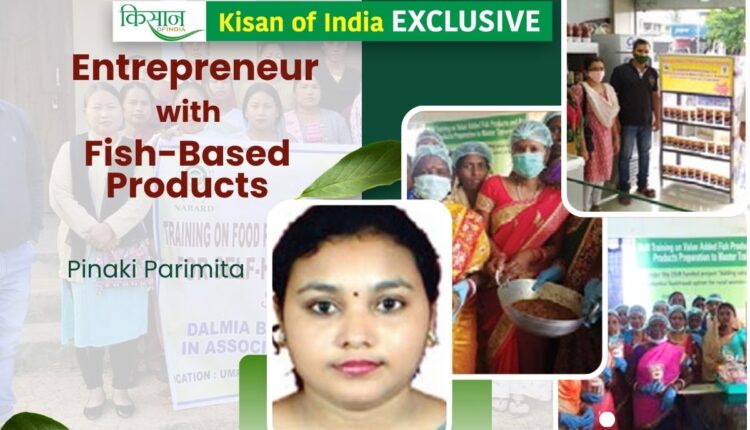Fish Products: The story begins in Odisha’s Astaranga block’s Kanamana village with that simple woman, who amidst the waves of the sea began shaping her fate — Pinaki Parimita. Once who was only engaged in mushroom, crab, and shrimp farming, today she has become the head of a fish product company named “Fishlikes,” and an inspiration for dozens of rural women.
First step on a path full of difficulties
Pinaki recalls,
“When during lockdown everyone was troubled, there was no work, then we thought — why not make proper use of the shrimp-fish near our village’s sea?”
No one had experience, no one had marketing understanding, and the biggest challenge was — where to start?
Start of learning: Training changed the perspective
From ICAR-CIWA, Bhubaneswar, Pinaki and her 12 women colleagues received skill training and entrepreneurship management training.
“We didn’t even know how business works! We learned from ICAR-CIWA how to make products, how to pack them, how to get licenses. That was our real start.”
Absolutely! Let’s write this part in more detail, in an emotional and inspirational style:
New identity as “Fishlikes”: From fish-shrimp story to women’s identity
When Pinaki Parimita and her companions decided that they would not stop at just mushroom, crab, or shrimp farming, but make value-added products like shrimp pickle, fish chips and sell them — then the first challenge in front of them was legal identity.
“We didn’t even understand that you need a license to start a business! With ICAR-CIWA’s help, we got the FSSAI license and trade license. Only then could we enter the market under the name ‘Fishlikes’.”
The name ‘Fishlikes’ is not just a brand, it is the dream of those women who were once limited to kitchens, but are now packaging their hard work, making it a brand, and launching it in the market.
Initially, they kept their products only in two local shops. Pinaki laughs and recalls,
“On the first day when we kept our pickle, chips in the shop, the heart was scared — don’t know if it will sell or not! But within the first week, the stock was sold out.”
It was as if the women’s courage got wings. Within four months, their products were being sold in 12 shops. Customers began asking, “Where does this fish pickle come from? Will we get more?”
Then their identity was no longer limited only to the village or block.
“Demand increased so much that we started sending products to West Bengal! We used to think, who will take our goods outside the village, but today our products are reaching other states.”
Even when the COVID-19 pandemic shut down the markets, Pinaki and her team did not stop. They started online marketing, reaching customers through social media, WhatsApp.
“We didn’t know marketing, but when challenges came before us, we learned — and that became our real strength.”
Today every packet of ‘Fishlikes’ is not just a product, it is a story — of those village women who, from the seashore, with their hard work and eagerness to learn, transformed the fate of their families, their village, and themselves.
Women’s team: Not just hard work, now master trainers too
Today, Pinaki is not only the leader of herself, but of the entire group. She says,
“We are now training other village women — how to prepare value-added fish products. Now we are not just makers, but also teachers!”
Earnings and market challenges
The group is earning a profit of ₹130-150 per kilogram of shrimp pickle.
“Marketing was the biggest difficulty. It doesn’t sell much in the local market, and sending it outside increases the cost. But we have also started trying our hand at online marketing.”
Power of solar dryer and hygienic packaging
ICAR-CIWA gave them a solar cabinet dryer, packing machine, and necessary equipment, with which they can make and pack products hygienically.
“Hearing the word hygiene, customers become happy! Such packaging is not common in Odisha, so our product looks different.”
Impact of change in the village
This enterprise has not only given employment to the women of Kanamana village, but also self-confidence.
“Earlier people used to say — oh, what business will village women do! Now the same people say — oh, learn from them!”
Pinaki’s words for other women
“Marketing problems will come, but don’t lose heart.”
“Take help from government institutions, ask, learn.”
“For people like us, there are places like Krishi Vigyan Kendra, ICAR-CIWA — connect with them.”
“If you learn once how business runs, then village women are no less than anyone!”
Pinaki Parimita’s message
“When we started, we didn’t know anything. But we decided — we will learn, we will move forward. And today, we are not just a ray of hope for ourselves, but for other women too.”
In the end… the true victory of courage
Pinaki Parimita’s story shows that if you want to learn, if you are hungry for change, then lack of resources cannot stop you. With the help of government institutions, one’s own hard work, and the strength of the team, she has reached a place from where now a new generation of women is moving forward.
So, sisters, if you have shrimp, fish, mushroom, or any other resource, then have the courage to move ahead with it. Learn, connect, and turn your dreams into reality with your hard work!
“He who learns, is the one who grows.”
Contact details: If farmers want to share information or experiences related to farming with us, then they can do this by calling us on the phone number 9599273766 or by writing an email to kisanofindia.mail@gmail.com or by sending your recording. Through Kisan of India, we will convey your message to the people, because we believe that if the farmers are advanced then the country is happy.

